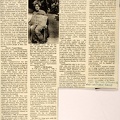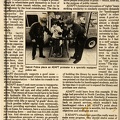[Headline] Riders in wheelchairs push buses to ADAPT
The American Disabled for Public Transit (ADAPT) staged a series of dramatic demonstrations last week at the annual convention for the American Public Transit Association (APTA) in Detroit.
ADAPT has pitted itself against APTA for the last four years, using civil disobedience to raise public awareness about the rights of severely physically disabled people. Highly dependent on public transit, people using wheelchairs have suffered under a 1981 federal court ruling that struck down provisions for equal access. APTA, the national lobbying group representing federally-funded public transit systems nation-wide, won that round.
The Detroit demonstrations were designed to gain the -- attention of APTA guests and the city, which does not have wheelchair lifts in every bus. The city rescinded ADAPT's original parade permit after police accused the group of "disruptive tactics." ADAPT did gain permission to demonstrate behind high barricades outside the convention. The 100 wheelchaired and 50 able-bodied protesters stayed on the sidewalks except where curb cuts were lacking. Later, however, they converged at Dearborn's Henry Ford Museum and blocked buses, forcing more than 1,500 APTA guests to walk the last half mile to the convention's cocktail reception.
At bus stops, ADAPT protesters in wheelchairs waited in front of the buses, held their doors open and tried to crawl into them. Several buses equipped with lifts did come, but the lifts reportedly were not working. Police arrested 17 people on charges of disorderly conduct.
For the estimated 1-2 percent of the population that is severely physically disabled, social prejudice is compounded by segregative obstacles such as stairs, curbs and narrow doorways. ADAPT's ultimate goal is a federal accommodations law, and it is training people in wheelchairs to assert themselves politically so they can fight the isolation that keeps them out of sight, out of mind and out of the mainstream. "Either everyone gets in, or no one," says Molly Blank, who works with ADAPT at its main office in Denver.
ADAPT and allied organizations point proudly to Denver and Seattle, where lifts have been installed in all buses. Upkeep of lifts in 'Denver's buses has cost less, than other cities may think. "[Maintenance workers] don't wait for the lifts to break down," says ADAPT's Wade Blank. "When they do an oil change, they check them for adjustments and do a lube job. Chicago estimates costs of up to $2,500 per bus per year, but Denver spends only $400."
"The battle won't be won this week," Blank says. "We hope that in the next five years, the nation will reach a policy on accessibility."
-Jennefer Pittman
- Created on
- Thursday 11 July 2013
- Posted on
- Monday 31 July 2017
- Albums
- Visits
- 585
- Rating score
- no rate
- Rate this photo


0 comments